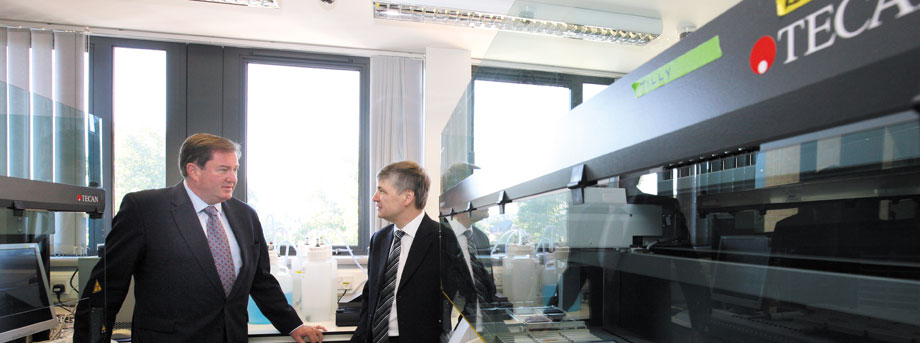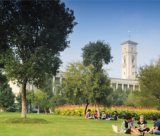Nottingham research leads to early cancer detection
September 2nd, 2010

University spin-out company Oncimmune Ltd has developed a ground breaking blood test which aids the detection of cancer up to five years earlier than current testing methods.
Physicians will know the result of their patient’s test within one week of sending in a blood sample to Oncimmune. The company has developed a new technique which replicates the cancer proteins that trigger the body’s response to the disease, alongside robotic technology to measure this response. This new technology (immuno-biomarkers) provides a significant advance in how early a cancer may be detected and is likely to change the current paradigm of diagnosis and treatment for most solid cancers such as lung, breast, ovarian, colon and prostate.
Based on the early work of John Robertson, a world renowned breast cancer specialist and Professor of Surgery in the Faculty of Medicine and Health Sciences, Oncimmune has successfully transferred this science into a reproducible commercial test. The test for lung cancer, EarlyCDT-Lung™ was launched nationally in the USA in June. The UK launch is expected in early 2011.
Initial research results were derived using blood samples from patients with breast cancer and a group of high risk women attending for annual mammography — which Prof Robertson had prospectively collected in Nottingham.
The samples were used to identify blood signals in cancer patients, and in the samples of those who were later known to have developed cancer — sometimes years later.
When these samples were run retrospectively, Prof Robertson showed that the prototype assay test could have detected over half of these cancers up to four years before they were actually diagnosed. The work on lung cancer followed through a European Union grant which involved both the University and Oncimmune in collaboration with a number of European partners.
Prof Robertson said: “I am very pleased that the initial exciting research data that we produced in the laboratories at the University a number of years ago have been translated by Oncimmune to the first of many tests that will help us identify cancer early. The support of the University at all levels, including past and present Vice-Chancellors, Deans of the Faculty of Medicine and Heads of School along with the University’s Management Board has been essential.
“It has been a long and at times very hard road in creating a robust commercial test. Those involved have worked with exceptional diligence and tenacity and have given their unremitting support to achieve this.”
Oncimmune LTD was founded in 2003 to commercialise the technology developed in the laboratories of Prof Robertson. In 2006 the company set up a North American operation to validate and scale-up the test — trialling it on more than eight million assay “wells” from 80,000 patient samples.
The first early cancer detection test to launch has the potential to detect the early stages of lung cancer up to five years before a tumour appears. The target population for this test are high-risk individuals such as long-term smokers and ex-smokers between the ages of 40 and 75.
Additionally the test would be appropriate for people who have been exposed to other risk factors associated with the disease. For instance, environmental exposures such as radon, asbestos and extensive exposure to secondary smoke.
The University will establish a Centre of Excellence for Autoimmunity in Cancer (CEAC) with Prof Robertson as the Director of Research. The new centre will foster collaborative research to: speed up the delivery of an autoantibody blood test for different types of cancer for clinical use; encourage other research in the area of autoimmunity in cancer; and continue the search for support technologies that have the potential to enhance the medical prognosis following a positive test result.
Tags: test
Leave a Reply
Other News

University of Nottingham Online discovery webinars
University of Nottingham Online (UoNO) is here to help colleagues across the university who want to […]

University of Nottingham China celebrates 20 years
At the University of Nottingham, we embrace diversity in culture, spirit and thinking. It’s why we […]

